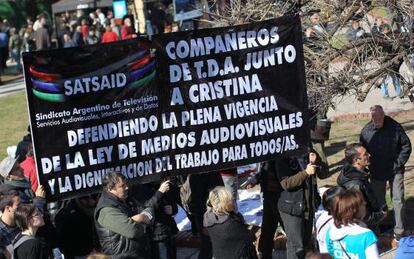Argentina's Supreme Court upholds controversial media law
The ruling is a victory for President Cristina Fernández de Kirchner


Argentina's Supreme Court, the highest court in the land, upheld four articles in the Audiovisual Media Law. Clarín, the country's largest media group and perhaps the greatest enemy of Kirchnerismo, had brought a suit against the measure.
The law will force the media giant and others to sell off licenses because the government has said it must prevent monopolies and preserve the diversity of public discourse. The judges ruled that Clarín and other groups that appealed to the courts to protest against the law will have to comply. But, the decision has also introduced a new element in the conflict: the government will have to compensate the companies for what they give up.
The ruling represents a victory for Cristina Fernández de Kirchner, who along with other leaders of the center-left and certain social movements had pushed for the bill's passage in 2009. Clarín, the company that will have to sell the largest number of licenses, argued that the law violated freedom of expression. The company is considering appealing to international courts.
The ruling limits the number of radio, television and cable licenses a group can hold. An estimated 21 groups will have to give up about 330 licenses, 150 to 200 of which belong to Clarín. Among the other 20 groups are Telefónica, the American group DirectTV, the businessman Cristóbal López (who has a history with the Kirchner family) and Prisa, the publishing house behind EL PAÍS, which proposed the transfer of various provincial radio licenses in exchange for majority holdings in Radio Continental in Buenos Aires.
The law was approved four years ago but the clause concerning limits on licenses and the consequent mandate for media groups to sell or transfer them had not been in force in light of Clarín's suit. A judge first upheld the measure in 2012 but last April an appeals court struck it down. Finally six of the seven members of the Supreme Court voted that the law was indeed constitutional.
The highest court in Argentina has gained some prestige in recent years since then-president Néstor Kirchner called for the removal of judges suspected of corruption and replaced them with celebrated independent jurists. Although at times the judges have ruled in favor of cases that benefited the Kirchners, they have also ruled against them as was the case this year when they struck down the judicial reform measure that Fernández proposed (though she was on official leave for health reasons until November 8).
In the media law case, of the four articles disputed, three were upheld in a 6-1 vote. The other clause determined that groups such as Clarín will have to dispose of their licenses within a year. It was upheld with four votes.
The ruling marks the end of the court battle that had endured since 2008 between the Kirchners and the media conglomerate owned by Ernestina Herrera de Noble y Héctor Magnetto. Until then they had been close but tensions surged over the 2008 agrarian reforms and Fernández found herself fighting tirelessly against what she called "monopoly." Thus she proposed the measure known as the Audiovisual Media Law. Some say it has been used as a front to go after Clarín but not after other groups that have made deals with the government. The Kirchner camp also proposed a law to oversee the paper used by newspapers in a country where only one company, Clarín, makes it. That bill was pushed back because Kirchner had authorized a 2007 merger between the company's cable TV station and its main competitor. Instead, an investigation opened to determine whether Herrera's children had been stolen from dissident families during the dictatorship of 1976-1983 - a theory that has been disproved through official DNA tests.
The ruling comes two days after the congressional elections that strengthened the Kirchner camp's majority in parliament though the divided opposition won in the main districts.
The Supreme Court took advantage of the ruling to warn Fernández. They called for transparent government policies on subsidies and access to information. They said the state media apparatus "should not be a mere instrument for the government's policies or a way to snuff out dissident voices." The judges warned that regulatory power should show "independence" and the law "should be reinforced while respecting equality and due process."
Translation: Dyane Jean François
Tu suscripción se está usando en otro dispositivo
¿Quieres añadir otro usuario a tu suscripción?
Si continúas leyendo en este dispositivo, no se podrá leer en el otro.
FlechaTu suscripción se está usando en otro dispositivo y solo puedes acceder a EL PAÍS desde un dispositivo a la vez.
Si quieres compartir tu cuenta, cambia tu suscripción a la modalidad Premium, así podrás añadir otro usuario. Cada uno accederá con su propia cuenta de email, lo que os permitirá personalizar vuestra experiencia en EL PAÍS.
¿Tienes una suscripción de empresa? Accede aquí para contratar más cuentas.
En el caso de no saber quién está usando tu cuenta, te recomendamos cambiar tu contraseña aquí.
Si decides continuar compartiendo tu cuenta, este mensaje se mostrará en tu dispositivo y en el de la otra persona que está usando tu cuenta de forma indefinida, afectando a tu experiencia de lectura. Puedes consultar aquí los términos y condiciones de la suscripción digital.








































